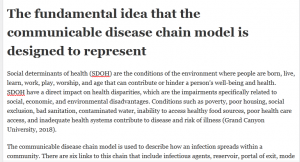The fundamental idea that the communicable disease chain model is designed to represent

Social determinants of health (SDOH) are the conditions of the environment where people are born, live, learn, work, play, worship, and age that can contribute or hinder a person’s well-being and health. SDOH have a direct impact on health disparities, which are the impairments specifically related to social, economic, and environmental disadvantages. Conditions such as poverty, poor housing, social exclusion, bad sanitation, contaminated water, inability to access healthy food sources, poor health care access, and inadequate health systems contribute to disease and risk of illness (Grand Canyon University, 2018).
The communicable disease chain model is used to describe how an infection spreads within a community. There are six links to this chain that include infectious agents, reservoir, portal of exit, mode of transmission, portal of entry, and susceptible host. Infectious agents are the bacteria, viruses, fungi, and parasites that can be spread and lead to disease. Reservoir is where the infectious agent lives and multiplies, to include people, animals, arthropods, plants, and soil. Portal of exit is the means by which a pathogen exits from a reservoir. From humans, the portal of exit can include blood, respiratory secretions, and anything leaving the GI and urinary tract. Mode of transmission is how the infectious agent can be passed which include direct contact, ingestion, or inhalation. Portal of entry is the way the agent enters a new host, which includes broken skin, respiratory tract, mucous membranes, catheters, and lines. A susceptible host is anyone who is already a carrier of the infection and those at risk (Help Break the Chain of Infection, 2021).
Nurses and other healthcare professionals can help ‘break the chain’ of communicable diseases by practicing proper hand hygiene, being up to date on vaccines, covering coughs and sneezes, and staying home when sick (Help Break the Chain of Infection, 2021). Other ways nurses can affect the spread of disease and infections is by practicing aseptic techniques and ensuring sterility during certain procedures. When observing others’ actions that may contribute to the spread of disease, nurses can educate them. In the healthcare setting, amongst many things, can include proper handwashing and use of PPE.
Using 200-300 words APA format with references in supporting the discussion.
What are social determinants of health? Explain how social determinants of health contribute to the development of disease. Describe the fundamental idea that the communicable disease chain model is designed to represent. Give an example of the steps a nurse can take to break the link within the communicable disease chain.